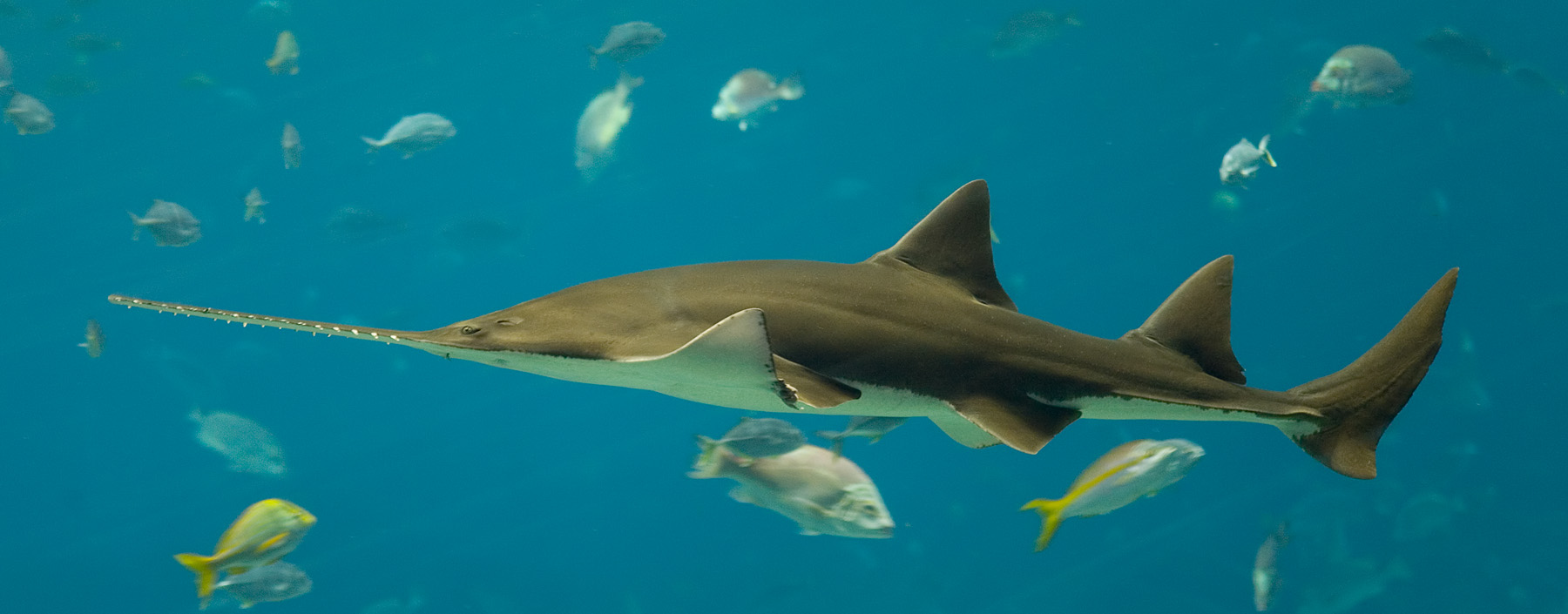Marine Life & Conservation
Clean Sweep For Sharks And Rays At CMS CoP11
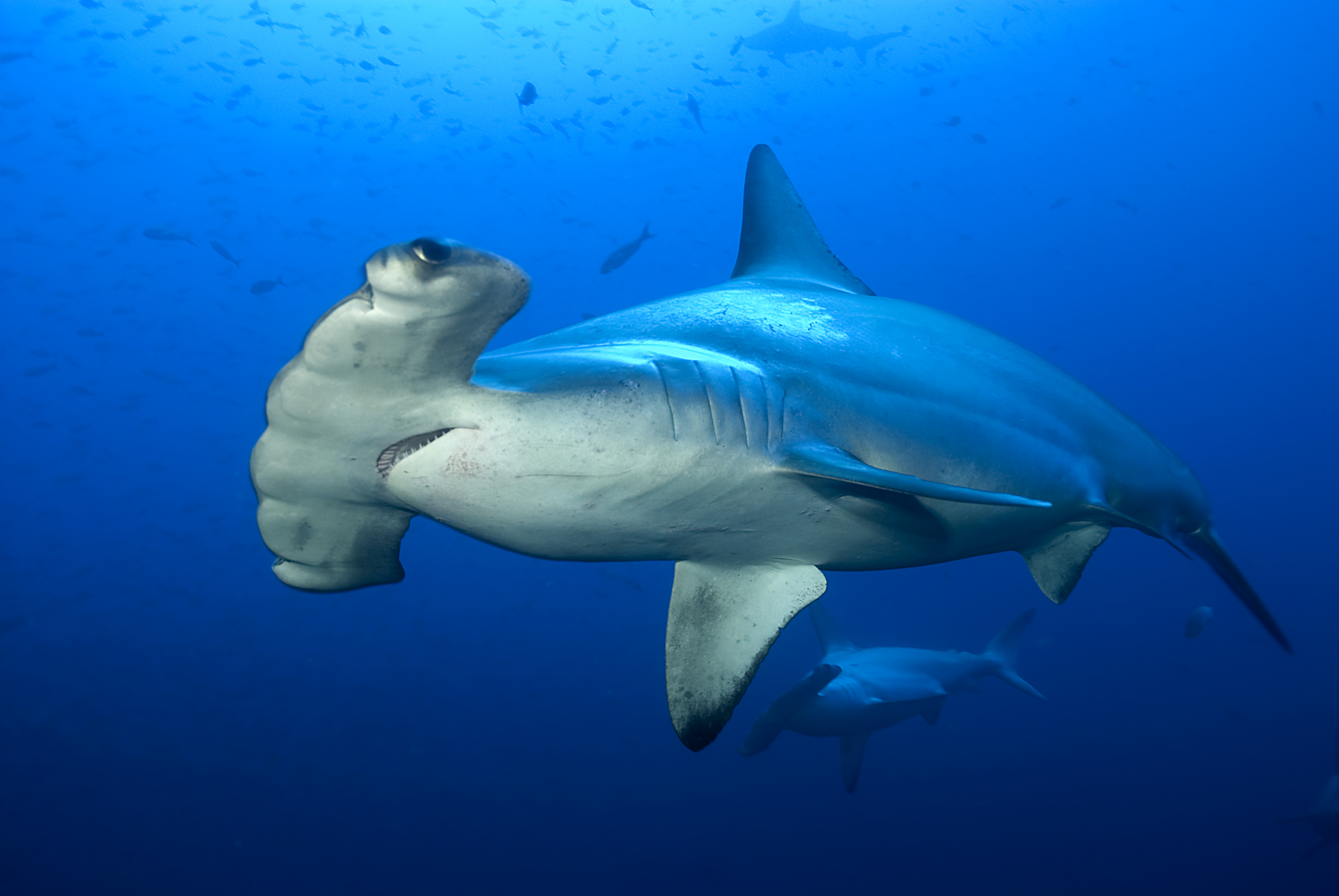
Parties from the UN conservation convention unanimously vote 21 species of threatened sharks and rays into the appendices of CMS
Quito, Ecuador November 9th 2014: Convention of Migratory Species of Wild Animals
Global momentum for elasmobranch conservation continued with a clean sweep at the CMS Conference of the Parties (CoP) in Quito, Ecuador yesterday, as all 21 proposed species of threatened sharks and rays were successfully listed on the appendices of CMS (CMS is an intergovernmental treaty under the United Nations Environment Program. CMS CoPs take place every 3 years).
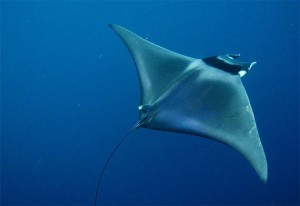 In summary, all five sawfish species, all nine species of Mobula (devil rays), and the reef manta ray have been listed successfully on Appendix I & II, which should bring about stricter protections for these species globally. Two species of hammerheads (the great & scalloped), all three thresher shark species (the bigeye, common and pelagic), and the silky shark have been awarded CMS Appendix II listing, which should encourage increased regional cooperation for their conservation.
In summary, all five sawfish species, all nine species of Mobula (devil rays), and the reef manta ray have been listed successfully on Appendix I & II, which should bring about stricter protections for these species globally. Two species of hammerheads (the great & scalloped), all three thresher shark species (the bigeye, common and pelagic), and the silky shark have been awarded CMS Appendix II listing, which should encourage increased regional cooperation for their conservation.
The Marine Megafauna Foundation is particularly delighted about the inclusion of sawfish, the world’s most endangered marine fish and of course the reef manta ray, which was overlooked in the 2011 proposal to list the giant manta ray on CMS.
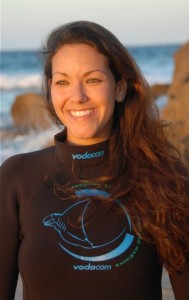 “This is another tremendous success for the rays,” gushed Dr. Andrea Marshall, director of the Marine Megafauna Foundation. “These CMS listings were sorely needed to help secure increased protection and management for these incredibly threatened species which are declining at alarming rates.”
“This is another tremendous success for the rays,” gushed Dr. Andrea Marshall, director of the Marine Megafauna Foundation. “These CMS listings were sorely needed to help secure increased protection and management for these incredibly threatened species which are declining at alarming rates.”
Marshall, who made a passionate intervention before the Parties on behalf of MMF and a collation of NGOs last Thursday, is the principal scientist for MMF’s Global Manta Ray Program and has been actively collecting data to support the proposal for Manta alfredi for years. She and her research team have conducted peer-reviewed scientific studies on three different continents demonstrating the highly mobile nature of this species in the lead up to CMS CoP11.
MMF scientists had already helped show that manta rays are amongst the least fecund of all shark and ray species with extremely conservative life history traits, most notably their small litter size. Low productivity species are highly vulnerable to human pressures, particularly fishing, one of the main reasons they are listed as vulnerable to extinction on the IUCN redlist of endangered species. However, to be eligible for a CMS listing, there needed to be evidence that the reef manta ray is also a migratory species in need of regional conservation efforts.
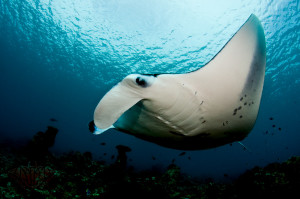 The MMF say they have been extremely concerned about the reef manta since their team documented a swift and significant 88% decline in observational sighting records of Manta alfredi at one of the most important aggregation areas for this species in the Indian Ocean. This local artisanal fishery for reef mantas in Mozambique predominantly uses resulting products domestically and operates at a much smaller scale than more organized fisheries for manta rays being monitored other parts of the globe. The implications of this study should be obvious and show the swift and devastating effects even small-scale fisheries can have on even relatively large populations of this species.
The MMF say they have been extremely concerned about the reef manta since their team documented a swift and significant 88% decline in observational sighting records of Manta alfredi at one of the most important aggregation areas for this species in the Indian Ocean. This local artisanal fishery for reef mantas in Mozambique predominantly uses resulting products domestically and operates at a much smaller scale than more organized fisheries for manta rays being monitored other parts of the globe. The implications of this study should be obvious and show the swift and devastating effects even small-scale fisheries can have on even relatively large populations of this species.
While international trade issues have been recently addressed with an Appendix II listing on CITES, domestic harvesting of Manta alfredi within range states is still an issue that threatens the survival of the species. This CMS listing will now encourage its protection within range states, prompt better management of populations and help to facilitate much needed research.
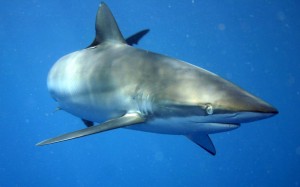 Across the world NGOs* have been voicing their opposition to unsustainable fisheries for sharks and rays, highlighting that these charismatic species would be much better used as drawcards for marine tourism, an ever-expanding and very lucrative industry that profits a wider variety of stakeholders and returns and expands the opportunity for continued profit to the countries where these species reside or frequent. Current estimates place global revenues from manta ray related tourism at close to $140 million US dollars annually.
Across the world NGOs* have been voicing their opposition to unsustainable fisheries for sharks and rays, highlighting that these charismatic species would be much better used as drawcards for marine tourism, an ever-expanding and very lucrative industry that profits a wider variety of stakeholders and returns and expands the opportunity for continued profit to the countries where these species reside or frequent. Current estimates place global revenues from manta ray related tourism at close to $140 million US dollars annually.
Manta rays cannot afford to be exploited and MMF have commended Fiji for sponsoring this proposal and Ecuador, the host country, for paving the way for global manta conservation in recent years.
“This is a major win for sharks and rays,” said Dr. Marshall. “these timely listings will go a long way to ensure that these species do not go extinct in the wild.”
To find out more about the MMF visit www.marinemegafauna.org.
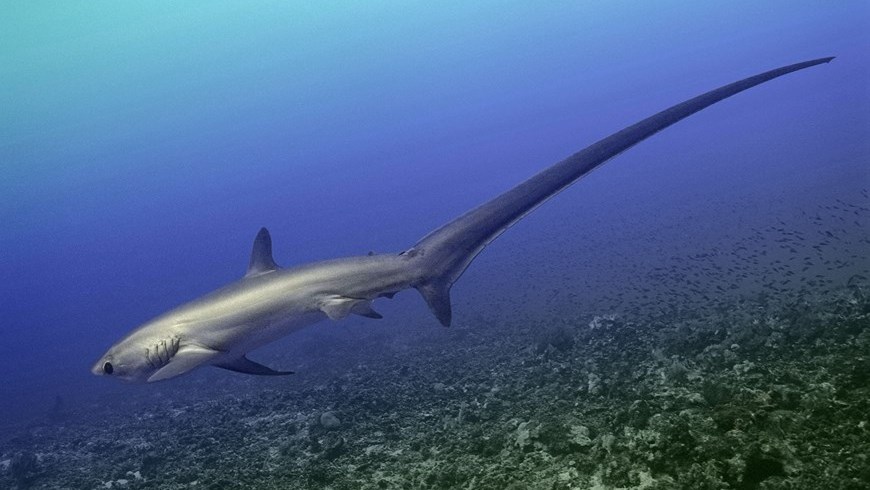 *In addition to the MMF, other NGOs actively supporting shark & ray proposals at CoP11 also included Shark Advocates International, Humane Society International, Project AWARE Foundation, Wildlife Conservation Society, PEW, Manta Trust, International Fund for Animal Welfare, & Pretoma.
*In addition to the MMF, other NGOs actively supporting shark & ray proposals at CoP11 also included Shark Advocates International, Humane Society International, Project AWARE Foundation, Wildlife Conservation Society, PEW, Manta Trust, International Fund for Animal Welfare, & Pretoma.
Blogs
The Ocean Cleanup Breaks 10,000,000 KG Barrier

The Ocean Cleanup, the global non-profit project, has removed a verified all-time total of ten million kilograms (22 million lbs.) of trash from oceans and rivers around the world – approximately the same weight as the Eiffel Tower.
To complete its mission of ridding the oceans of plastic, The Ocean Cleanup uses a dual strategy: cleaning up the Great Pacific Garbage Patch (GPGP) to remove the plastic already afloat in the oceans, while stopping the flow of plastic from the world’s most polluting rivers.
Through cleaning operations in the GPGP and in rivers in eight countries, the cumulative total of trash removed has now surpassed ten million kilograms. This milestone demonstrates the acceleration of The Ocean Cleanup’s impact, while underlining the astonishing scale of the plastic pollution problem and the need for continued support and action.
While encouraging for the mission, this milestone is only a staging point: millions more tons of plastic still pollute our oceans and The Ocean Cleanup intends to continue learning, improving and innovating to solve this global catastrophe.
This announcement comes as governments from around the world meet to continue negotiations to develop a new legally binding instrument to end plastic pollution at INC4 in Ottawa, Canada. Representatives of The Ocean Cleanup will be in attendance and the organization will be urging decision-makers to collaborate towards a comprehensive and ambitious global treaty which addresses plastic at all stages of its life cycle and in all marine environments worldwide, including in areas beyond national jurisdiction.
It is encouraging to see that the need for remediation is reflected in the various options for potential treaty provisions. It is essential that the final treaty contains clear targets for the remediation of legacy plastic pollution, and reduction of riverine plastic emissions.
Tackling plastic pollution requires innovative and impactful solutions. The treaty should therefore incentivize the innovation ecosystem by fostering innovations that make maximal use of data, technology and scientific knowledge – such as those designed and deployed by The Ocean Cleanup.
‘After many tough years of trial and error, it’s amazing to see our work is starting to pay off – and I am proud of the team who has brought us to this point.’ said Boyan Slat, Founder and CEO of The Ocean Cleanup. ‘While we still have a long way to go, our recent successes fill us with renewed confidence that the oceans can be cleaned.’
The Ocean Cleanup was founded in 2013 and captured its first plastic in 2019, with the first confirmed catch in the GPGP coming soon after the deployment of Interceptor 001 in Jakarta, Indonesia. After surpassing one million kilograms of trash removed in early 2022, the non-profit project has since progressed to the third iteration of its GPGP cleaning solution, known as System 03, and a network of Interceptors currently covering rivers in eight countries, with more deployments set for 2024.
About The Ocean Cleanup
The Ocean Cleanup is an international non-profit organization that develops and scales technologies to rid the world’s oceans of plastic. They aim to achieve this goal through a dual strategy: stemming the inflow via rivers and cleaning up the legacy plastic that has already accumulated in the ocean. For the latter, The Ocean Cleanup develops large-scale systems to efficiently concentrate the plastic for periodic removal. This plastic is tracked and traced through DNV’s chain of custody model to certify claims of origin when recycling it into new products. To curb the tide via rivers, The Ocean Cleanup has developed Interceptor™ solutions to halt and extract riverine plastic before it reaches the ocean. Founded in 2013 by Boyan Slat, The Ocean Cleanup now employs a broadly multi-disciplined team of approximately 140. The foundation is headquartered in Rotterdam, the Netherlands.
For more information, visit: theoceancleanup.com and follow @theoceancleanup on social media.
Marine Life & Conservation
Steve Backshall to headline Shark Trust’s flagship event: For the Love of Sharks

Join a host of amazing, shark loving, speakers including Steve Backshall and the Shark Trust team for an evening celebrating shark conservation at the Royal Geographical Society in London this November.
Date: 29th November 2024
Time: 6-10pm
Location: Royal Geographical Society, London
Tickets: https://www.sharktrust.org/Event/flos24
The event will be a celebration of all things shark. Those lucky enough to get hold of tickets will hear from engaging guest speakers with a passion for sharks.
The line-up includes (*subject to change if unforeseen circumstances arise)
Steve Backshall: One of television’s busiest presenters, BAFTA award-winning wildlife expert Steve has been passionate about the wild world ever since he was young.
Steve’s impressive TV career has taken him all around the world, investigating a wide array of species and environments. Steve has filmed over 100 hours of children’s wildlife programmes with the BAFTA award winning Deadly 60 franchise and recently, with Sky Nature, for his new series ‘Whale with Steve Backshall’. He has been a patron for the Shark Trust for 10 years.
Simon Rogerson: is a photojournalist specialising in natural history, diving and the sea.
He is editor of SCUBA magazine, the official journal of the British Sub-Aqua Club. Simon started his career as a crime reporter but gravitated towards his ‘less depressing’ interest in underwater exploration, joining the staff of DIVE magazine in 1999. In 2005 he was named ‘Editor of the Year’ in the PPA’s Independent Publishing Awards. Simon also works as a freelance writer, contributing frequently to the Sunday Times and Telegraph, in addition to BBC Wildlife, Esquire, and a host of international diving magazines. He is the author of a book, Dive Red Sea, published by Ultimate Sports. Now based in Berkshire, Simon has been a Patron of the Shark Trust for 20 years.
More speakers to be announced soon. Head to the Shark Trust website to learn more.
The evening will also allow guests the final chance to see the Oceanic 31, shark art exhibition. Some of the artwork will be auctioned/raffled at the event, while the rest will be auctioned online to raise money for the Shark Trust Oceanic Programme.
For the Love of Sharks is an evening with something for everyone who is interested and fascinated by sharks. Join the Shark Trust, their Patrons, Trustees and Staff, along with a host of supporters for this celebration of shark conservation.
For more information or to buy a ticket: https://www.sharktrust.org/Event/flos24
-

 News3 months ago
News3 months agoCapturing Critters in Lembeh Underwater Photography Workshop 2024: Event Roundup
-

 Marine Life & Conservation Blogs3 months ago
Marine Life & Conservation Blogs3 months agoCreature Feature: Swell Sharks
-

 Blogs2 months ago
Blogs2 months agoMurex Resorts: Passport to Paradise!
-

 Gear Reviews3 weeks ago
Gear Reviews3 weeks agoGEAR REVIEW – Revolutionising Diving Comfort: The Sharkskin T2 Chillproof Suit
-

 Blogs2 months ago
Blogs2 months agoDiver Discovering Whale Skeletons Beneath Ice Judged World’s Best Underwater Photograph
-

 Gear Reviews3 months ago
Gear Reviews3 months agoGear Review: Oceanic+ Dive Housing for iPhone
-

 News2 months ago
News2 months agoPADI Teams Up with Wellness Brand Neuro to Drive Ocean Change and Create a Blue State of Mind
-

 Marine Life & Conservation2 months ago
Marine Life & Conservation2 months agoSave the Manatee Club launches brand new webcams at Silver Springs State Park, Florida



